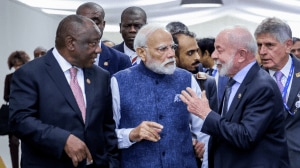33 per cent of hope and glory
It's been eight years since the 73rd constitutional amendment reserving 33 per cent of seats for women at the grassroot level was implemen...

It’s been eight years since the 73rd constitutional amendment reserving 33 per cent of seats for women at the grassroot level was implemented in Maharashtra. And eight years of struggle, failure, success and hope for the women who were catapulted into positions several of them were unprepared for.
Women may have been elected, but men continue to rule by proxy. Several of the women are from families with political backgrounds and often, they have filled seats which their husbands or other male relatives couldn’t contest only because they were reserved for women. Take Sindhutai Kadam, a Zilla Parishad (ZP) member of Yavatmal. An housewife who was a perfect foil to her husband Subhashrao – former ZP member and sarpanch for 25 years – till 1997, she contested the seat her husband had to relinquish. Ask her anything and her assertive husband replies: “She will contest the elections again if the seat stays reserved, or else, I will.”
A chat with Vithabai Pimpalkar, sarpanch of Chaparda, a interior village in Yavatmal district, makes it clear that the impact of the revolutionary amendment has bypassed several women. Pimpalkar, a tribal, is illiterate, and five years of holding on to the all-important post hasn’t made her any wiser. “Gharche mansach karoon ghetat kaam” (the menfolk do the needful), she shrugs.
Several women don’t like to attend meetings, let alone try and decode the system. Jaya Dhurve (28), a Gram Panchayat (GP) member, is totally dependent on her male counterparts for information. “They don’t listen to me at all, so I don’t feel like going to meetings. Nothing has been done in my area, they simply ignore me,” Jaya, who can’t even sign her name, says.
Illiterate as they are, few of the women understand the schemes floated by the government or even their role within the system. Vithabai does not even know who the local MLA is. She knows only vaguely that the government provides money for developmental works in the village. Her immediate concern is to look for manual labour to keep her home fires burning.
Tackling the unrelenting, male-dominated babudom is another big hurdle for the women, even in a metropolis like Nagpur. The Nagpur Zilla Parishad has been helmed by a woman for the last one-and-a-half years. Though Sumantai Bawankule is educated, she finds the system tough to crack. “Officialdom is very difficult to tackle,” she confesses, adding that mild-mannered women simply can’t “speak their (the men’s) language”.
It was this male-dominated officialdom that made Vandana Bais, president of the Women and Child Development Committee of Yavatmal ZP, decide against re-contesting her seat. A humiliating experience with a official in her department when she tried to curb corruption has left her very bitter. Bais comes from a political background, yet, the every-day difficulties faced on the job have discouraged her. Bais has otherwise had a successful term and has been instrumental in getting several developmental works commissioned.Women like Bais fade away from the scene once the seats get dereserved. Only a few like Venutai Katawle, president of theYavatmal ZP, retain their enthusiasm. While her husband teaches at a village 100 kms away, Katawle lives alone in her official bungalow, tackling all kinds of problems, including intra-party politics. What has helped her is prior experience as a GP member.
Women like 27-year-old Gargi Giratkar also lend hope that the amendment will ultimately only empower women. A science graduate, Giratkar was elected as a GP member from Umarsara, Yavatmal, in 1995 at the age of 22. To counter opposition, she had to circulate a pamphlet announcing that she would not get married until her term was over. Five years later, she is a Sarpanch, still unmarried and still determined to do something positive. “If you are capable of taking your own decisions, no one can pressurise you,” she asserts.
Her sentiments are echoed by Pramilabai Lokhande, sarpanch of Mansar, Nagpur district. A widow who raised her children by doing sewing work, she is at once respected and feared by male members of her panchayat. Educated only till the primary level, she has done one term as GP member.
Takshashila Waghdhare, ZP member of Mahadula (Nagpur), points out, “How will women learn unless they come out of their homes and have some bitter experiences?” An activist since childhood, Waghdhare has overcome domestic opposition to contest her seat. “We have to get used to the fact that men will complain. It is natural, since they can’t digest the fact that women could be equal to them,” she says.
Ramesh Mankar, vice-president of Nagpur ZP, feels that reservations for women is a welcome step. “This will allow them to come out of the shadows,” he states. But it is equally important to train women so that they can be more effective, he feels.
Mankar also feels that women or no women, corruption continues unabated and developmental works are as delayed as ever. “Few women members understand welfare schemes and thus cannot get them implemented. Developmental works get delayed during their term,” adds a male GP member, on conditions of anonymity.








- 01
- 02
- 03
- 04
- 05























